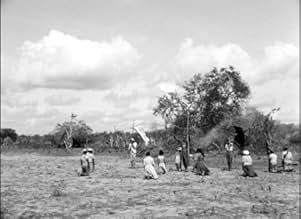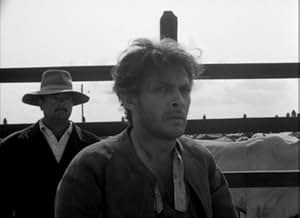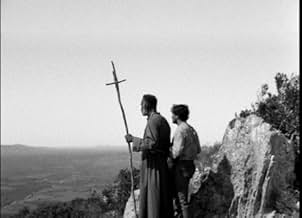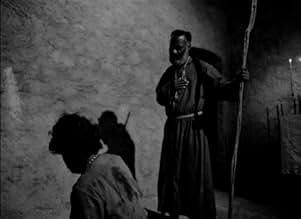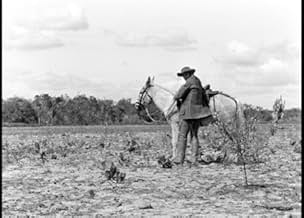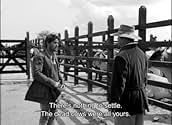IMDb रेटिंग
7.2/10
6 हज़ार
आपकी रेटिंग
अपनी भाषा में प्लॉट जोड़ेंAfter killing his employer when he tries to cheat him out of his payment, a man becomes an outlaw and starts following a self-proclaimed saint.After killing his employer when he tries to cheat him out of his payment, a man becomes an outlaw and starts following a self-proclaimed saint.After killing his employer when he tries to cheat him out of his payment, a man becomes an outlaw and starts following a self-proclaimed saint.
- निर्देशक
- लेखक
- स्टार
- पुरस्कार
- कुल 1 नामांकन
Milton Rosa
- Moraes
- (as Milton Roda)
Marrom
- Cego Júlio
- (बिना क्रेडिट के)
फ़ीचर्ड समीक्षाएं
I saw this film on the premise of that it according to critics is the "best Brazilian film of all times". Critics are way too generous to this young auteur influenced by Eisenstein and other masters, mixing genres and styles but only achieving an amateurish, confused, pretentious and quite tasteless work. It is messy, low-budget and is overall not worth watching despite a handful of nice shots and moments. In an accompanying interview to the film, the director Rocha, with Marxist rhetoric, blame European colonists for Latin America's economic problems and justifies the movie's content as "the aesthetics of hunger". To me, more than anything else, it shows the madness of religion and cults and how they attract people in desperation.
Nothing wrong with a movie that is being a bit slower and different, as long as it fascinates. And this movie does that well.
It's an unusual movie, with an unusual approach and story. This is not a slick Hollywood movie here but an artistic South-American one. It doesn't really follow any familiar movie rules but having said that, this movie at the same time still remains a perfectly accessible one.
Even though there are of course some deeper meanings behind it all, the movie never feels too serious or heavy handed. The movie actually still manages to entertain as well, which is for most part thanks to its very lively characters, who especially come to live in its second half. Most people seem to have most problems with the movie its second half but I actually do think that this was the strongest and most intriguing part of the entire movie, since it seemed to focus more purely on its characters and less on its story, that is a complicated one to follow and completely understand.
What I foremost love about this movie is that it's being shot like a western, while it's actually a totally different genre movie, set in Brazil. The cinematography, directing, characters and such still make this movie really feel and look like a good old spaghetti western.
Due to its directing approach and way of storytelling this is a very visual orientated movie. Even though it can be a slow movie at times, its visuals still manages to fully keep you interested throughout. It's black & white cinematography does ensure this well.
No need and reason to overpraise this movie but it remains simply a good and special one to watch.
7/10
http://bobafett1138.blogspot.com/
It's an unusual movie, with an unusual approach and story. This is not a slick Hollywood movie here but an artistic South-American one. It doesn't really follow any familiar movie rules but having said that, this movie at the same time still remains a perfectly accessible one.
Even though there are of course some deeper meanings behind it all, the movie never feels too serious or heavy handed. The movie actually still manages to entertain as well, which is for most part thanks to its very lively characters, who especially come to live in its second half. Most people seem to have most problems with the movie its second half but I actually do think that this was the strongest and most intriguing part of the entire movie, since it seemed to focus more purely on its characters and less on its story, that is a complicated one to follow and completely understand.
What I foremost love about this movie is that it's being shot like a western, while it's actually a totally different genre movie, set in Brazil. The cinematography, directing, characters and such still make this movie really feel and look like a good old spaghetti western.
Due to its directing approach and way of storytelling this is a very visual orientated movie. Even though it can be a slow movie at times, its visuals still manages to fully keep you interested throughout. It's black & white cinematography does ensure this well.
No need and reason to overpraise this movie but it remains simply a good and special one to watch.
7/10
http://bobafett1138.blogspot.com/
Glauber Rocha just 25 when he made this and I was only seven year younger although I had never watched this before but maybe then I might have loved it more but now I find it rather difficult. Clearly I can see that it is an amazing idea but punishing to have done this in Monte Santo, Bahia this drought-ridden hinterland of the North-East of Brazil. Manoel has killed his cheating ranch owner and then his mother dies and he and his wife go off to follow a self proclaimed saint. It is slow, and Christ like but also much violence. Although there is even more to come. It is difficult watching Manoel climb up the mountain on his knees and with a 20 kilo stone on his head and apparently the actor decided he should really do it. I found that during this part I thought of Bunuel with Simon of the Desert (1965) and his man on a column. Towards the end with the last few people moving between each other and I thought of Michelangelo Antonioni. Now and again I wondered about Jodorowsky's El Topo (1970), however this film is on its own and even if it is a bit slow it is surely worth a look.
At just 25, Brazilian director Glauber Rocha directed Black God, White Devil, now considered one of the most important pictures to ever come out of Brazil, and a key entry into the Cinema Novo movement. Combining elements of Sergio Leone, Italian neo-realism, and Soviet propaganda such as the work of Sergei Eisenstein, Rocha created a brutal, grainy world inhabited by suicidal religious fanatics, wandering hit men, and psychopathic bandits. From the opening shots of rotting animal corpses and the endless Brazilian sertão, Rocha portrays a grim social realism, one of the key aspects of Cinema Novo.
Ranch-hand Manuel (Geraldo Del Rey) lives in poverty with his wife Rosa (Yona Magalhaes). Fed up with his situation, he goes into town to sell his stock, only to have his boss try to cheat him out of his money, so Manuel kills him with a machete. Fleeing the authorities, he falls in with maniacal preacher Sebastiao (Lidio Silva), who leads Manuel, Rosa and his other followers on a killing spree. Circumstances lead to Manuel leaving the cause, and joining up with famous bandit Corisco (Othon Bastos), who also leads the couple on an orgy of meaningless violence and thievery. But shadowy gun-for-hire Antonio das Mortes (Mauricio do Valle), having been paid by the church and a poltician, is hot on Corisco's tail.
The film very much reminded me of Cormac McCarthy's astounding novel Blood Meridian, where the sheer brutality of the violence played as a metaphor for a society gone sour and a world intent of self-destruction. Like Blood Meridian's The Kid, Manuel and Rosa follow blindly to whichever cause they see a glimmer of hope in. They fail to see the lunacy of Sebastiao's behaviour, and it's only at the point where he stabs a baby in the heart that their eyes seem to be opened, only for them to shack up with the gibbering Corisco, a man who speaks like a poet but doesn't seem to be able to comprehend his own existence. It is at this point, about two-thirds in, that the film seems to lose momentum and becomes somewhat of an unfathomable mess.
But it isn't just the social-political ponderings that make Black God, White Devil so memorable, it also has style in abundance. The camera-work is shaky and urgent at times, full of character close-ups from awkward angles, but it also uses fast editing reminiscent of Eisenstein's greatest works. Similar to Battleship Potemkin's (1925) Odessa steps sequence, the Monte Santo chapel massacre at the hands of Antonio das Mortes is simply electrifying. It is das Mortes' presence that leads to the moments that evoke the work of Sergio Leone, wrapping the shady anti-hero in moody atmosphere like Clint Eastwood's Man With No Name. It's a dangerous mixture of conflicting styles that works beautifully, making the film beautiful and cool, occasionally horrifying, and undoubtedly important. It's just a shame it doesn't manage to keep up with the absolutely astonishing opening two-thirds.
Ranch-hand Manuel (Geraldo Del Rey) lives in poverty with his wife Rosa (Yona Magalhaes). Fed up with his situation, he goes into town to sell his stock, only to have his boss try to cheat him out of his money, so Manuel kills him with a machete. Fleeing the authorities, he falls in with maniacal preacher Sebastiao (Lidio Silva), who leads Manuel, Rosa and his other followers on a killing spree. Circumstances lead to Manuel leaving the cause, and joining up with famous bandit Corisco (Othon Bastos), who also leads the couple on an orgy of meaningless violence and thievery. But shadowy gun-for-hire Antonio das Mortes (Mauricio do Valle), having been paid by the church and a poltician, is hot on Corisco's tail.
The film very much reminded me of Cormac McCarthy's astounding novel Blood Meridian, where the sheer brutality of the violence played as a metaphor for a society gone sour and a world intent of self-destruction. Like Blood Meridian's The Kid, Manuel and Rosa follow blindly to whichever cause they see a glimmer of hope in. They fail to see the lunacy of Sebastiao's behaviour, and it's only at the point where he stabs a baby in the heart that their eyes seem to be opened, only for them to shack up with the gibbering Corisco, a man who speaks like a poet but doesn't seem to be able to comprehend his own existence. It is at this point, about two-thirds in, that the film seems to lose momentum and becomes somewhat of an unfathomable mess.
But it isn't just the social-political ponderings that make Black God, White Devil so memorable, it also has style in abundance. The camera-work is shaky and urgent at times, full of character close-ups from awkward angles, but it also uses fast editing reminiscent of Eisenstein's greatest works. Similar to Battleship Potemkin's (1925) Odessa steps sequence, the Monte Santo chapel massacre at the hands of Antonio das Mortes is simply electrifying. It is das Mortes' presence that leads to the moments that evoke the work of Sergio Leone, wrapping the shady anti-hero in moody atmosphere like Clint Eastwood's Man With No Name. It's a dangerous mixture of conflicting styles that works beautifully, making the film beautiful and cool, occasionally horrifying, and undoubtedly important. It's just a shame it doesn't manage to keep up with the absolutely astonishing opening two-thirds.
This movie is considered by the critics as the most important Brazilian movie of all times. And they are right in this point. An impressive, outstanding portrait of Brazilian rich culture with a focus on some delicate subjects as religion, faith, violence and economic exploration. Rocha made here a fantastic synthesis of the main problems of Brazil, problems that still remained almost forty years after. Great performances by Del Rey and Mauricio do Valle.
क्या आपको पता है
- ट्रिवियाIn the scene where we see Manuel (Geraldo Del Rey) carrying a huge stone over his head while climbing Monte Santo on his knees, Del Rey insisted on carrying a real stone that weighted over 20 kilos - something that really worried director Glauber Rocha. After the shooting, Del Rey had to take 2 days off, as he wasn't in condition to show up.
- कनेक्शनEdited into A Edição do Nordeste (2023)
- साउंडट्रैकManuel e Rosa
Written by Glauber Rocha & Sérgio Ricardo
टॉप पसंद
रेटिंग देने के लिए साइन-इन करें और वैयक्तिकृत सुझावों के लिए वॉचलिस्ट करें
- How long is Black God, White Devil?Alexa द्वारा संचालित
विवरण
- रिलीज़ की तारीख़
- कंट्री ऑफ़ ओरिजिन
- आधिकारिक साइट
- भाषा
- इस रूप में भी जाना जाता है
- Black God, White Devil
- फ़िल्माने की जगहें
- उत्पादन कंपनियां
- IMDbPro पर और कंपनी क्रेडिट देखें
बॉक्स ऑफ़िस
- US और कनाडा में सकल
- $7,826
- US और कनाडा में पहले सप्ताह में कुल कमाई
- $3,200
- 19 नव॰ 2023
- दुनिया भर में सकल
- $7,826
- चलने की अवधि2 घंटे
- रंग
- ध्वनि मिश्रण
- पक्ष अनुपात
- 1.37 : 1
इस पेज में योगदान दें
किसी बदलाव का सुझाव दें या अनुपलब्ध कॉन्टेंट जोड़ें


